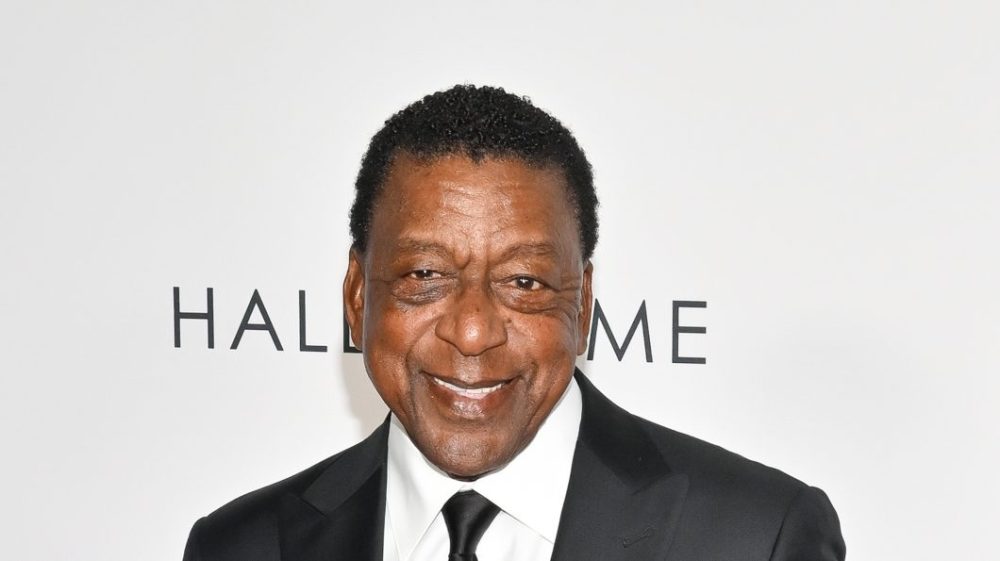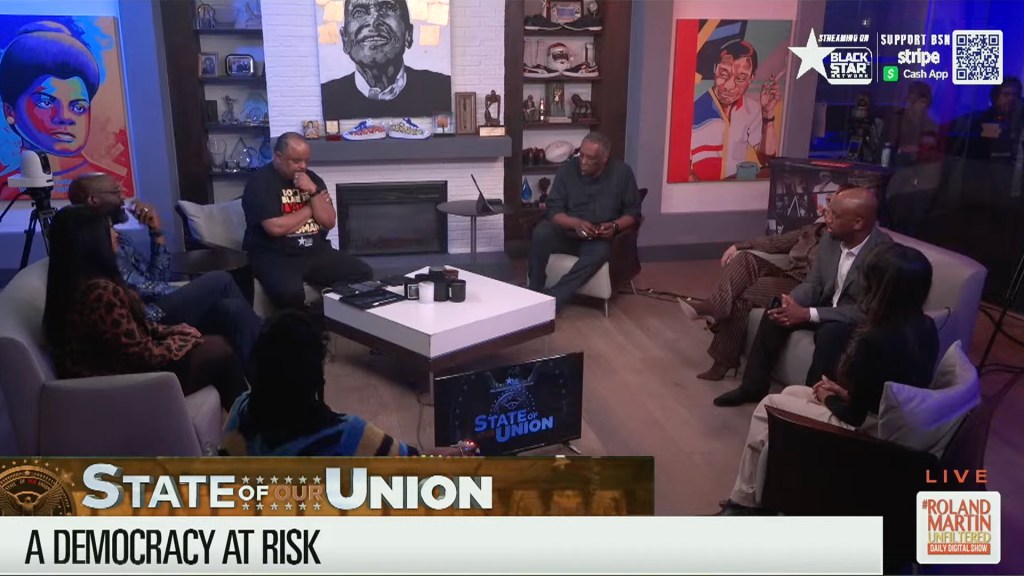Detavio Samuels, CEO of Revolt, unpacks his effort to revitalize the cable and digital brand in its second decade on the latest episode of Variety podcast “Strictly Business.”
Amid the disruption in pay TV, racial tension in the body politic, the return of Trump and the challenge of steering an independent Black-owned media platform, Samuels is looking at an uphill climb. Revolt is coming off a hard 2024 as its founder, Sean Combs, was indicted on federal charges of racketeering and sex trafficking. He’s been accused of heinous crimes.
Combs was key to Revolt’s origin story – the channel was born a dozen years ago in a very different time for media, as Samuels discusses.
But Combs has had very little involvement with the operation of Revolt for years. He became fully divested of his stake last year as his legal problems mounted. As of 2024, Revolt has transitioned to an employee ownership structure. That’s a rarity for a media company of any size. Revolt, with operations largely based in New York and Atlanta, has about 150 full-time employees, and another 100 or so contract employees at any given time.
Popular on Variety
Samuels has to thread the pay TV needle carefully as he evolves Revolt. The company still operates a linear cable channel. But it has embraced the ubiquitous model of free social media distribution across YouTube, Instagram, TikTok and other platforms. In Samuels’ view, the Revolt brand and its associated talent must be ever-present in the social feeds of its target demographics, which are a diverse mix of young adults.
“What we would say is that for Revolt specifically, the DJ might be Black, the music might be Black, but everybody’s invited to the party,” Samuels says.
Samuels points to Revolt’s successful hip-hip gossip and music industry dish podcast “Caresha Please” as an example of how Revolt looks to spread its content across social media and online platforms.
“For us, the big win is to be distributed everywhere,” he says. “When we air an episode of ‘Caresha’ you will see her be top 10 trending topic on Twitter and dominating social. You’ll see her be top five trending Apple podcast. And then you’ll see her be top 10 trending on YouTube. Wherever people want to consume, however they want to consume based on their own personal behaviors, that’s where our content needs to live.”
I connected with Samuels to check in on Revolt after the crisis involving Combs as part of my reporting for the Variety cover story published March 25 on Charlamagne Tha God. Charlamagne is a prime example of a new-model media mogul adept at tapping into digital distribution to build audiences across platforms: radio, TV, podcasts, live media, merch.
I’ve always been interested in independents and mavericks that blaze their own trails. The social media revolution allows creators to do just that. But some are able to build more than just engaging social media feeds.
There’s an undeniable surge of creativity and innovation in next-generation media outlets that are squarely targeting Black audiences. Charlamagne and his podcast networks. Veteran journalist Roland Martin and his Black Star Network – which serves up daily news and commentary shows via YouTube and other platforms. Martin’s shows look and sound for the most part like any other cable news roundtable shows – except for the salty language.
There are many more examples – including the production banners and assets assembled in recent years by past “Strictly Business” guests Charles D. King, founder and CEO of Macro, the busy production and talent management firm; and filmmaker Tommy Oliver, CEO of the Confluential Companies. It’s an exciting upsurge of independent media at a time when a half-dozen corporate giants hold more sway than ever over traditional media.

Robert Johnson in 2022 (Photo by Michael Buckner/Variety via Getty Images)
Variety via Getty Images
As part of my reporting, I also reached out to Robert Johnson, the founder and former owner of BET and one of the industry’s most successful entrepreneuers, for his perspective on how the landscape has evolved for Black-owned media. Johnson had a lot to say, as you’ll hear after the conclusion of the conversation with Samuels.
“In the digital world, it’s trying to build content and an attractive streaming platform to appeal to audiences of all races and colors,” says Johnson, who now runs the RLJ Companies investment portfolio. “African Americans, being some of the heaviest viewers of content, are very much attractive to people who want to generate money off a subscription to streaming service or the advertisers who want to sell products to that audience. So the answer to the question is — how do you define Black Media?”
***

Black Star Network’s “The State of Our Union” live stream telecast aired March 4 as counterprogramming to President Donald Trump’s Address to Congress
Courtesy of Black Star Network
When veteran journalist Roland Martin set up shop on YouTube in 2018 as the anchor and producer of a daily political news and analysis program, he was advised by a mid-level YouTube executive that such a show geared toward Black viewers “just doesn’t work” on the internet.
Fast-forward to March 4, 2025, when Martin’s Black Star Network delivered a six-and-a-half-hour live special called “The State of Our Union,” offered as an alternative to Donald Trump’s address to the joint session of Congress. That telecast, originating from Black Star’s small studio in Washington, D.C., ranked fifth among all livestream coverage on YouTube related to Trump’s nearly two-hour speech. Martin found his niche in 2018. And in so doing, he’s built one of the most expansive wholly Black-owned TV news and commentary operations around.
Martin, at 57, is a prime example of an established influencer with a devoted following who has deftly harnessed the free digital distribution that is available via YouTube, Facebook, Instagram, Roku and others. From his years as a correspondent and anchor for CNN and TV One, he’s perfectly positioned to succeed as a digital media entrepreneur. His “Roland Martin Unfiltered” and other shows on the Black Star Network generated nearly $2 million in advertising last year from YouTube alone.
Still, Black Star Network operates with a fraction of the budget of Fox News, The Associated Press or other mainstream news outlets. “Unfiltered” typically runs live at 6 p.m. The show offers a survey of headlines, commentary and lively debates on a range of pressing political issues and cultural trends by panels of Black academics, lawyers, activists, legislators, civil servants, experts and entrepreneurs. Martin and a small team of producers run the operation with iPads and ring lights mixed in with professional-grade equipment. The panelists are largely assembled via Zoom but occasionally gather at the D.C. studio or an event that “Unfiltered” travels to cover.
Martin’s work has taken on a furious pace in the past few months amid the Trump administration’s campaign against diversity, equity and inclusion protocols and health, welfare and Medicaid cuts that will fall hard on vulnerable Black Americans.
RELATED CONTENT: ‘This is Hope 2.0’: Journalist Roland Martin’s Black Star Network Thrives Via YouTube, Viewer Donations
The single biggest impediment to the growth of Black Star Network is the lack of support from the major media buying agencies that control Fortune 500 advertising budgets.
“Black-owned media has been unable to sufficiently grow because there is economic apartheid being practiced by ad agencies and many media companies,” Martin says. “I get pitched all the time by companies and publishers trying to get their talent on my show. Guess what? I never get any business from those companies. They value my audience enough that they want to promote their shows to my audience, but they don’t value my audience enough to actually buy ads. So how can I have a business where I’m giving you free media and I stay in business?”
The MAGA-fueled crusade to roll back decades of civil rights gains is slashing programs that supported Black businesses and communities.
“We are looking at a potential economic calamity impacting the Black community, because we’re going to see a massive disinvestment in Black-owned businesses,” Martin says. “You’re going to see Black law firms, Black accounting firms, Black engineering firms, architectural firms not get those professional-services deals. For us in Black-owned media, we’re going to see companies not take out ads, not do deals with us, not do custom content deals. But still they want to access our customers. So this is a serious issue.”


